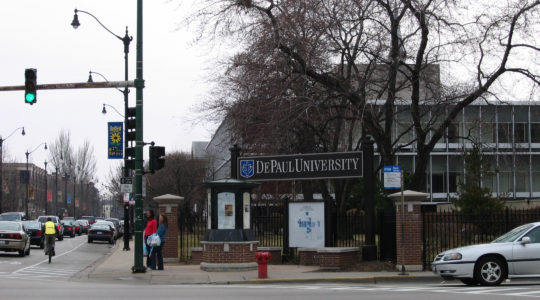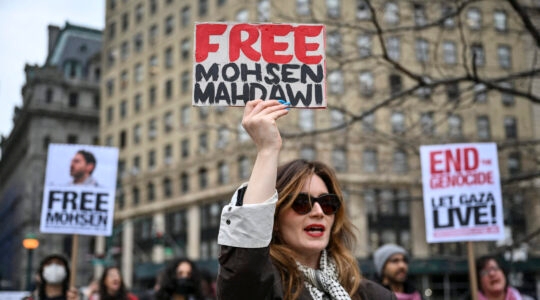NEW YORK (JTA) – Long on symbolism and short on substance, Pope Benedict XVI’s trip to New York and Washington last week revealed a pontiff serious about strengthening Catholic-Jewish relations.
It was a visit that included substantial outreach to the Jewish community.
In encounters with Jewish leaders in both cities, the pope expressed his goodwill and hopes for continued dialogue while offering greetings for the Passover holiday.
But just as significant was what he did not mention – his decision last year to revive the Latin Mass, whose Good Friday liturgy includes a prayer for Jewish conversion.
That decision has drawn fierce criticism from some Jewish organizations, along with warnings that the revival of the prayer could undo much of the progress in Jewish-Catholic relations over the past four decades.
The pope also did not expressly declare the Church opposed to converting Jews, a step that some Jewish leaders have been seeking.
Still, even those who have had harsh words for the Vatican over the issue praised the symbolic value of his attention to the Jewish community.
The national director of the Anti-Defamation League, Abraham Foxman, who was among some 50 American Jewish leaders who attended a private meeting with the pontiff in Washington on April 17, said the pope’s blessing for Passover was an implicit acknowledgment of the validity of Judaism.
“He took the time to meet with the Jewish community in addition to the interfaith community, and then separately bless us on Passover, which is an affirmation of a Jewish festival and a Jewish belief and a Jewish ritual,” Foxman said.
Last July, Foxman called the decision to reinstate the Latin Mass a “body blow to Catholic-Jewish relations” and a retreat from the spirit of Nostra Aetate, the landmark Vatican document that absolved Jews of collective responsibility for the killing of Jesus Christ and set the stage for four decades of interreligious dialogue.
In addition to the Passover blessings, some Jewish observers see the pope’s reaffirmation of Nostra Aetate as an implicit recognition by the Church of the Jewish covenant with God.
The attention lavished on the Jewish community by the pope was unequaled by any other faith group during his visit. A day after his meeting in Washington with Jewish communal leaders, Benedict made a historic appearance at the Park East Synagogue in New York – his first visit to an American shul.
Benedict spoke only briefly at both venues, conveying good wishes for the forthcoming Passover holiday and affirming his respect and goodwill for the Jewish community.
Jewish leaders responded with gifts for the pontiff – in Washington, a menorah presented by B’nai Brith International director of intercommunal affairs David Michaels, and in New York, a silver seder plate presented by Rabbi Arthur Schneier of Park East Synagogue.
“It is with joy that I come here, just a few hours before the celebration of your Pesah, to express my respect and esteem for the Jewish community in New York City,” Benedict said during his synagogue visit.
The Washington meeting was held following a larger interfaith gathering that included some 200 representatives of the Jewish, Muslim, Christian, Hindu and Jain faiths.
“At this time of your most solemn celebration, I feel particularly close, precisely because of what Nostra Aetate calls Christians to remember always: that the Church ‛received the revelation of the Old Testament through the people with whom God in His inexpressible mercy concluded the Ancient Covenant. Nor can she forget that she draws sustenance from the root of that well-cultivated olive tree onto which have been grafted the wild shoots, the Gentiles,’ ” read the text of a message Benedict delivered to the Jewish leaders.
Benedict continued, “In addressing myself to you, I wish to reaffirm the Second Vatican Council’s teaching on Catholic-Jewish relations and reiterate the Church’s commitment to the dialogue that in the past 40 years has fundamentally changed our relationship for the better.”
Jewish leaders have been divided on the question of the Latin Mass since the issue first arose last summer, and the International Jewish Commission on Interreligious Consultation – the umbrella body responsible for dialogue with the Vatican – has been unable to reach a consensus.
Some have called for the pope to issue an unequivocal rejection of missionizing to the Jews, while others have argued that Jews cannot tell Catholics how they ought to pray.
“I have a strong opinion that we have no business even bringing it up with them,” said Rabbi Tzvi Hersh Weinreb, the executive vice president of the Orthodox Union, who greeted the pope at the White House on April 16 and participated in the interfaith meeting the next day. “It’s their business, as long as they’re not calling for hate and enmity.”
Nonetheless, the Vatican has taken steps to alleviate Jewish concerns.
The prayer was revised to remove the most offensive elements, including a reference to Jewish “blindness” in rejecting Christianity. Church officials then issued a series of statements intended to reassure Jews that the Vatican was not retreating from Nostra Aetate but rather was expressing an “eschatological” hope, not an actual imperative.
For example, a statement issued earlier this month through the Vatican Secretary of State, Cardinal Tarcisio Bertone, declared that the revival of the Latin Mass was in “no way” intended to “indicate a change in the Catholic Church’s regard for the Jews which has evolved from the basis of the Second Vatican Council, particularly the Declaration Nostra Aetate.”
Still, some Jewish leaders remain unsatisfied and had hoped that Benedict would finally put the matter to rest. That possibility now seems extremely unlikely, given Benedict’s multiple opportunities to address Jewish concerns in recent days.
But while no one is suggesting that Catholic-Jewish relations have been derailed, some still expect that the Vatican eventually will have to make explicit its position on Jewish conversion.
“I’m disappointed that he didn’t take the opportunity to clarify the Good Friday Mass, to make it clear not only to Jews but to the Catholic world that it’s not intended as a prayer for the conversion of Jews,” said Seymour Reich, the treasurer of the International Jewish Commission on Interreligious Consultation who stressed he was speaking in a personal capacity.
“That has to be corrected at some point because the German, Italian and Austrian Jewish communities have indicated their displeasure and intent to boycott this pope,” Reich said. “I hope he takes our concerns seriously and rectifies the issue for us.”
JTA has documented Jewish history in real-time for over a century. Keep our journalism strong by joining us in supporting independent, award-winning reporting.





